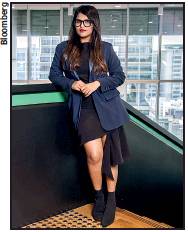Zilingo
This is a collection of articles archived for the excellence of their content. |
2019
Unicorn status

From: Madhav Chanchani, 27-year-old set to become first Indian female CEO of unicorn, February 13, 2019: The Times of India
Zilingo, a Southeast Asia-focused fashion ecommerce platform co-founded by 27-year-old Mumbai native Ankiti Bose, has reached near-unicorn status. The four-year-old startup was valued at about $970 million in its latest round, according to two sources. This would make Bose the first Indian female co-founder and CEO of a high-value startup.
The Singapore-headquartered company’s tech is powered from Bengaluru, where its co-founder and IIT Guwahati alumnus, Dhruv Kapoor, leads a 100-person team.
Zilingo has become the most successful new economy venture in the region by Indian entrepreneurs, mopping up $226 million in the latest round from Sequoia Capital, Singapore’s sovereign wealth fund Temasek and Germany’s Burda Principal Investments (announced on Tuesday). The startup has racked up a total $306 million in funding.
“Personally, a lot of men have been very helpful to me in my journey. But, of course, if you have more women in venture capital and more female entrepreneurs, then things will get a lot better,” says Bose.
‘Cross-cultural sensitivity helped me’
Bose, who graduated from St Xavier’s College, Mumbai, with an economics and mathematics degree in 2012, says having empathy and being sensitive when dealing with people across cultures — from techies in Bengaluru to fashion gurus in Singapore to conservative Muslim merchants in Indonesia — has helped her.
Starting up for women entrepreneurs is not easy. Last year, India ranked at 52—just ahead of Iran, Saudi Arabia, Algeria, Egypt and Bangladesh—on the 57-country list of Mastercard Index for Women Entrepreneurs. Among other major startup ecosystems, the US is ranked in the top five, while China is in the top
30. The number of women entrepreneurs stood at 14% in 2018, according to a recent survey by Nasscom, up from 10% and 11% in the previous two years, respectively.
“Personally, a lot of men have been very helpful to me in my journey. But of course, if you have more women in venture capital and more female entrepreneurs, then things will get a lot better,” said Bose. She says having empathy and being sensitive when dealing with people across cultures—from techies in Bengaluru to fashion gurus in Singapore to conservative Muslim merchants in Indonesia-—has helped her.
Bose was scouting for investments in Southeast Asian markets like Indonesia and Philippines for Sequoia Capital India in late 2014 when she met Kapoor in Bengaluru. Kapoor was working as a software engineer at gaming studio Kiwi. Bose, who has also worked at McKinsey in Mumbai, said that while evaluating investments in Southeast Asia, she saw that a higher number of women participate in the workforce, giving them higher disposable incomes.
Also, unlike the Indian market—where players like Flipkart (which owns Myntra and Jabong) and Amazon India, besides a slew of well-funded fashion portals Limeroad and Voonik existed—there were no players serving the Southeast Asia market. The duo figured they have complementary skill sets and started Zilingo-.com in early 2015 as a consumerfacing fashion portal, looking to bring bazaars of Southeast Asia online.
“Ankiti was a terrific member of the analyst class at Sequoia India before starting Zilingo—she was razor sharp, hardworking and always switched on. While she always had the raw ingredients, it’s been amazing to witness her transformation into a bold and dynamic founder and a business leader,” said Shailendra Singh, MD of Sequoia Capital India, which seed-funded the company back in 2015.
By late 2016, Bose realised that there was a bigger opportunity in helping small merchants scale up and compete with big brands like Zara and Uniqlo through a business-tobusiness (B2B) platform. Of the total $3 trillion in fashion manufacturing done globally, about $1.4 trillion is done from Asia, according to the company, presenting a much bigger opportunity than consumer-facing commerce business.
So, the company built a set of tools connecting these merchants to logistics services, helping them get loans and insurance, besides analytics.